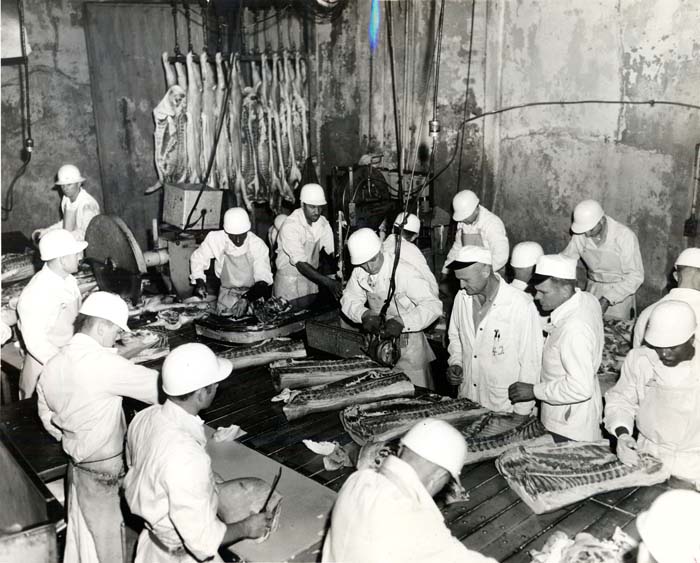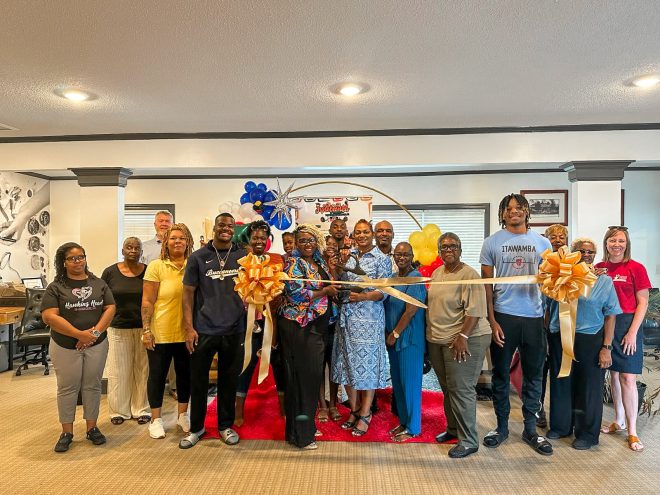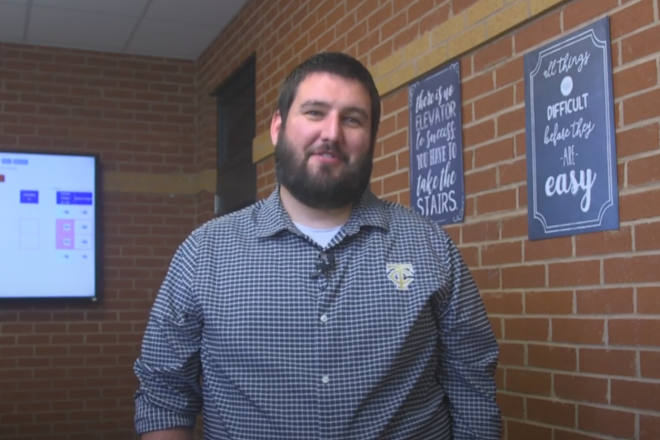Sunnyland economic cog in Thomasville for 68 years
Published 4:47 pm Saturday, October 18, 2014

- Sunnyland employees work in the meat-cutting room, circa 1970, to provide customers with quality, fresh meat.
THOMASVILLE — Sunnyland Foods was once a household name in providing the South and other parts of the country with meat products during 68 years of operation in Thomasville.
Many people in the community were employed there, as the company employed about 1,400 workers at one time, with about 900 being Thomas County residents.
Memories of Sunnyland Foods still linger, not unlike the aroma of signature Sunnyland bacon sizzling on the stove.
In 1932, Sunnyland Foods was founded by five men who saw a great need for a meat-packing plant in Southwest Georgia. J.W. Horne, W.F. Cox, John Lake “Fritz” Roberts, Waldo Deloach and Claude Jarman formed Farmers Meat Co. in Thomasville during the Great Depression. They were convinced difficult economic times would decline. This was the beginning of what would become Sunnyland.
John Lake “Fritz” Roberts is credited with being the powerhouse businessman behind the origin of Sunnyland. He served as secretary and treasurer of the company from 1932 to 1943, when he was elected the president.
A 2008 Times-Enterprise story says, “The history of Sunnyland began in the early 1930s, when John Lake Roberts, known as “Fritz,” was struggling on a salesman’s salary.”
During the inception of Farmers Meat Co., the Roberts and the other businessmen began with only three open-bed delivery trucks, drivers who doubled as salesmen and 16 plant workers who produced smoked ham, bacon and sausage.
According to the 1968 edition of the National Cyclopaedia of American Biography, Roberts purchased Farmers Meat Co. in 1932, with Will T. Cox.
“Moultrie attorney Waldo DeLoach bought stock in the company,” according to the Times-Enterprise story.
In those days, salting and curing of the meat was done by hand, and a smoked ham required 15 days for production.
The Sunnyland promotional booklet, produced in 1985, said, “These pioneering meat packers did a lot of things right because despite the depression, the company grew rapidly.”
As the company grew, it also had a change in name — Georgia Packing Co. It moved to a new location in 1933.
It was during this time that a new manager joined the plant — the force that would boost the plant into becoming Sunnyland Foods.
In 1936, L.B. Harvard joined as sales manager and helped the company grow even more.
The business modernized technology during the 1930s. The new plant expanded and soon became federally inspected, allowing the company to expand into distributing products to other states.
Harvard directed the company, and it expanded even further throughout the years.
“After 53 years of private ownership, Sunnyland Foods Inc. was purchased by Bongrain, S.A., based in Paris, France. Bongrain specializes in yogurt, cheese, and specialty meat and dairy products marketed under a variety of brand names around the world,” a promotional booklet said.
Sunnyland Foods grew from the small, family-run company to a worldwide organization in about two decades.
Sunnyland claimed to be “that tradition of quality throughout the Southeast, and will be even more aggressive in their quest for superior quality and unparalleled service.”
For Thomasville, Sunnyland was the meat processor of the Southeast. According to a 2008 Times-Enterprise story, “It was said to be the largest regional meat processor east of the Mississippi River.”
In 1951, the company entered the poultry market. The National Cyclopaedia of American Biography said, “The company’s growth was assisted by the heavy demand for meat products during the period of the Second World War and by a continuing high level of demand for meat products during the period following the war. In addition to its operations in meat, mainly the processing and marketing of beef, pork and sausage, the company entered the poultry field in 1951.”
It was not long before Sunnyland became the county’s largest employers. The Times-Enterprise reported “with an average of 550 workers in the meat-packing operation and another 125 in poultry.”
The company also had plants in Gainesville and Orlando (Fla.) and Dothan (Ala.), along with a dog food-canning plant in Thomasville.
In 1945, sales were $7 million. At the time, Roberts was president and treasurer, DeLoach was vice president and secretary, L. B. “Dude” Harvard was vice president and general manager, and J.W. Brambett as vice president and office manager.
When Roberts died in 1961, L.B. Harvard and John Pidcock of Savannah bought the company, each owning 50 percent of the shares.
It was not until 1980 that Sunnyland peaked with sales at $200 million. During this time, there were about 1,200 workers.
Two employees who remember the glory days of Sunnyland are Roosevelt Andrews and Teresa White, both of Thomasville.
Andrews worked at Sunnyland in various positions for 26 years. He was only 18 years old when he began there in 1974.
His jobs consisted of working in the fresh-meat department, cooking ham with steam, being a formulator and later a production line leader.
According to Andrews, Sunnyland had everything workers needed.
He said, “It had everything you needed. There were showers and nurses on duty if a worker got hurt.”
The management also was considered one of a kind by Andrews.
“There was great management who cared. They always asked how you were doing. The benefits were good, too,” said Andrews.
Teresa White saw a different side of Sunnyland. She worked in data-processing at the business from 1973 until 1976.
“I worked in data-processing as a key punch operator, which included keying in meat orders from salesmen from a dictaphone,” said White. “It was my first job out of high school, and it was job that I really enjoyed. I even met Eddie Arnold, the country singer, while I was there. He did some commercials for Sunnyland at that time.”
Changes once again took hold of Sunnyland. In 1985, the French company Bongrain, S.A., sold it to Lykes, which was purchased by Smithfield Foods.
The decline of Sunnyland began to emerge in the mid-1980s. It was change in distribution and consolidation of the retail business that worked against regional packers, according to Joe Harvard, who was president of Sunnyland during its last several years, according to Times-Enterprise 2008 story.
Thomasville’s Sunnyland Foods plant officially closed in 2000 — leaving behind memories of one of the largest and most productive meat-processing plants in the Southeast.





